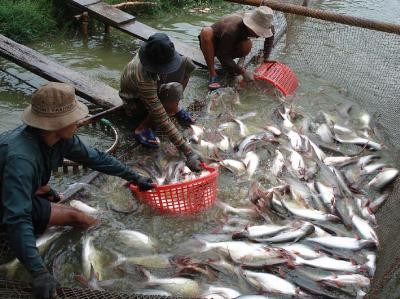(VOVworld) – The US Department of Commerce (DOC) has decided to impose anti-dumping tariffs on Vietnamese frozen fish fillets as part of its administrative review. The unfair decision released last Friday will cause difficulties for Vietnamese tra fish exporters. The DOC selected Indonesia as the reference country for calculating anti-dumping duties on frozen fish fillets imported from Vietnam. VOV correspondents in the US have pointed out errors in the unreasonable US decision.
 |
| High anti-dumping duties influence Vietnamese tra fish raisers (Photo: Google) |
The DOC decision imposes new tax rates which are ten times more than the previous rates, which will jump from just a few cents per kilo to several dollars per kilo. For example, the Vinh Hoan Company, which has the biggest turnover on tra fish exports to this market, will have to pay a tax rate of 0.19 USD a kilo, not the 0% it paid for the past four consecutive years. Sixteen other Vietnamese firms will see their average tax rate soar from 0.77 to 3.87 USD per kilo. On average, Vietnamese fish raisers will suffer a loss of up to 0.14 USD for every kilo of tra fish due to increased input costs and lowered prices. If the price of tra fish continues to decline in addition to the new anti-dumping tariff, Vietnamese farmers will undergo a double loss. Tran Van Trung, a tra fish raiser in Chau Phu district in the Mekong River province of An Giang, shares his feeling: ‘We can’t stand anymore, as we have suffered from losses for two consecutive years. Some have even given up their careers and others are making an unusual effort to continue raising the fish. The losses were due to a rise in the price of fish food, medicine, breeding stock, and bank interest rates.’
The initial difficulties faced by local raisers will create a domino effect for Vietnamese producers and processors in terms of purchasing, production, and exports.
The final decision of the DOC annual administrative review, issued last Friday, was based on a pricing study by the Indonesian Government. The study was based on Indonesia’s average product price for these products instead of the actual prices, leading to a great price gap between Vietnam and the reference country. Dao Tran Nhan, Head of the Vietnam Trade Office in the US, comments ‘The DOC’s decision was strongly influenced by groups of US catfish farmers and processors, particularly the Catfish Farmers of America, who lobbied the DOC to use Indonesia rather than Bangladesh for its tax calculations, in order to reduce the competitiveness of Vietnamese tra fish against US mudfish in this market’.
In a previous administrative review, the DOC repeatedly protested the choice of Indonesia as the third country for reference in calculating the input costs of catfish production because Indonesia does not have adequate price data and lacks basic financial parameters. Moreover, Indonesia is a net importer of frozen catfish fillets, mainly from Vietnam, and exports no catfish to the world market. For eight consecutive years, the DOC used Bangladesh as a reference for commodity catfish and raising fish in ponds as Vietnam does. Indonesia raises five kinds of tra fish and only 70% of the catfish in 2011 were raised in ponds. More specifically, Indonesia’s five types of catfish are different from those of Vietnam and Bangladesh. There’s no good reason to use Indonesia as a reference country and its data are not reliable enough for the tax calculations in the DOC’s administrative review.
The Vietnam Association of Seafood Exporters and Producers (VASEP) representatives say they will continue to take steps to protect Vietnam’s tra fish industry through any legal means available to persuade the DOC to change its decision. Mr. Nhan notes further ‘Lawyers for the defendant will work with the US Department of Commerce to review the method of calculating new tax rates. If it’s not correct, the defendant can ask the DOC to adjust the tariffs. In addition, Vietnam can ask its lawyers to initiate legal proceedings against the DOC’s decision in the US Court of International Trade.’
According to VASEP, last year the US was the second largest export market for Vietnamese catfish after the EU, with a turnover of more than 358 million USD, accounting for over 20% of the total export turnover of Vietnamese cattish. The US high anti-dumping tariff will affect not only Vietnamese exporters but have a negative impact on other markets and the entire catfish industry. And, obviously, American consumers will have to pay more one of their favorite dishes.